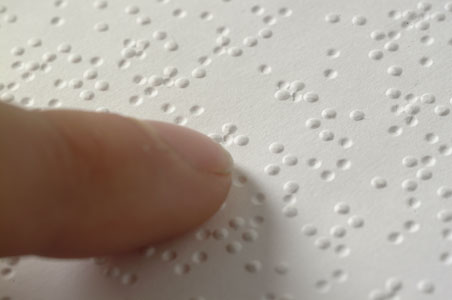Ever thought a blind person could draw as easily as a ‘normal’ person? Seems impossible, doesn’t it. But scientist Dilip Bhatt’s invention “Pragya” (named after his wife), changes all that. The senior ISRO scientist, who has long stints in Sriharikota and Allahabad to his name, is the father of a visually impaired boy, Nikunj. His own family was apprehensive about his son’s future and the limited opportunities available to him.
In order to let his son experience the joys of creating art and try his hand at drawing, Dilip decided to design a solution, and Pragya was the result.

Photo source: wikimedia
“Blind people’s world is limited to six dots of braille and I wanted to change that. With my mechanical engineering background, I started looking at ways I could teach him geography and language,” he told IndiaTimes
He first took a 1.5′ x 1.5′ wooden board, and attached velcro to it. He then designed a pen that would release woollen thread. The thread, when released, sticks to the velcro, thereby providing a tactile canvas.
After the work is completed, the thread can be rolled back onto a spool situated on top of the pen. This simple, yet extremely useful machine secured a patent in 2000.
Pragya has been very well received for its innovative design, and the fact that it doesn’t require electricity. It is now prepared by blind people around around India, and is also used in several schools, even those located in remote areas.
Pragya isn’t Bhatt’s only invention. He has designed several other simple devices, ranging from toothpaste nozzles to easy-to-hold cutlery, all to make a blind person’s life easier.
Not surprisingly, for 22-year-old Nikunj, his father, who is also his best friend, is his role model.
“He learnt Sanskrit to help me revise lessons for my BA course. He has never made me feel that there are things I cannot do. I trek, I ride a bicycle and also perform on stage without fear,” says Nikunj.
Like this story? Or have something to share? Write to us: contact@thebetterindia.com, or connect with us on Facebook and Twitter (@thebetterindia).
If you found our stories insightful, informative, or even just enjoyable, we invite you to consider making a voluntary payment to support the work we do at The Better India. Your contribution helps us continue producing quality content that educates, inspires, and drives positive change.
Choose one of the payment options below for your contribution-
By paying for the stories you value, you directly contribute to sustaining our efforts focused on making a difference in the world. Together, let's ensure that impactful stories continue to be told and shared, enriching lives and communities alike.
Thank you for your support. Here are some frequently asked questions you might find helpful to know why you are contributing?

